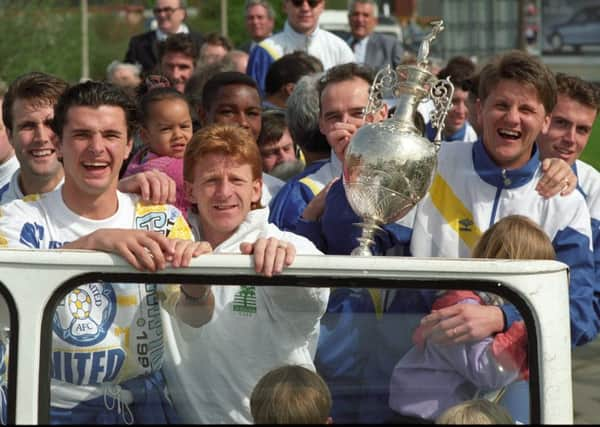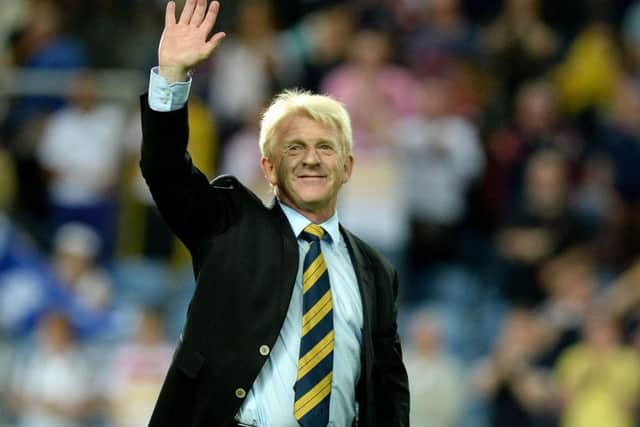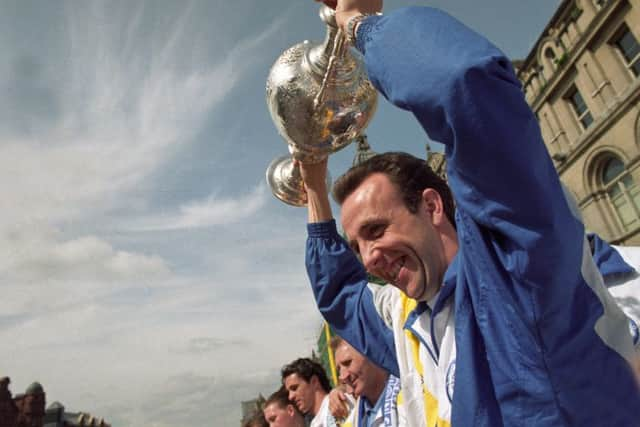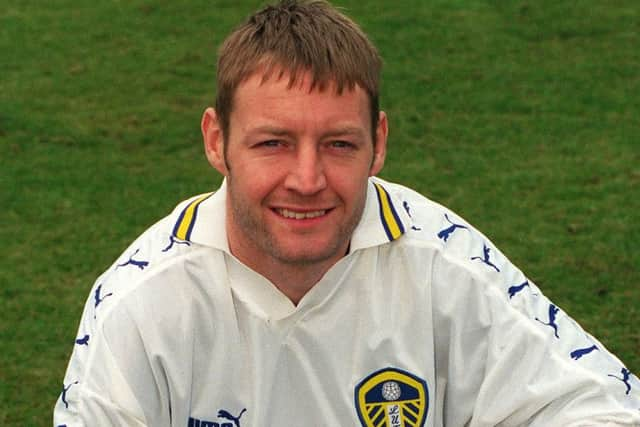Leesd United: Exclusive interview with Gordon Strachan


Gordon Strachan did not grow up dreaming of English league titles. Born in Edinburgh, his only schoolboy ambition was simple and closer to home. “As a 13-year-old, all I wanted was to score for Hibs against Hearts,” Strachan says. “That was it for me. After that I let it all flow and took my career as it came. I wasn’t one for holding ambitions.”
In Leeds he fulfilled them for other people and has always had the city’s gratitude. Twenty-five years on from Leeds United’s Division One title win in 1992, the reminiscing is starting again. Howard Wilkinson, the manager who brought it home, was at Elland Road last Friday for an event arranged to mark the anniversary. Strachan will be there later this week to relive a season which even Alex Ferguson described as an “excellent campaign”.
Advertisement
Hide AdAdvertisement
Hide AdLeeds “persevered resolutely and held their nerve on the run-in,” Ferguson conceded in his first autobiography. Strachan, ever the singular character, celebrated with a cup of tea as Manchester United fell before the finishing line.


‘The Last Champions’ was the name given to Wilkinson’s squad by Dave Simpson, a fan and author who chronicled the 1991-92 showdown a decade later, and in a sense Leeds were; the last before the Premier League ate the first division and the last to deliver the title for an English coach. But it all mattered less to Strachan than 1990 and the Division Two triumph which was the seminal moment of Wilkinson’s tenure.
Strachan had promised to win the second division when he signed for Leeds in 1989. The events of 1992 were, in his words, a “nice extra”.
“What happened in the league below gave me more satisfaction,” Strachan says. “That sounds back-to-front but it’s quite simple. When I went to Leeds it was the only time in my whole career when the people signing me said ‘we need you to do this for us’. Howard Wilkinson, Bill Fotherby (United’s managing director) – they simply said ‘we need to get out of the second division’. So I had to help make it happen. There was no other point in my career when I felt that way.”
Advertisement
Hide AdAdvertisement
Hide AdAt the time Strachan was a columnist for the YEP and an article written by him in the days after Leeds won the second division with a 1-0 victory at Bournemouth still exposes that sense of responsibility.


“The pressure’s been stored up over 46 games,” Strachan wrote. “I feel like a balloon deflating and there was a great sense of relief at the final whistle.” But Strachan did not deflate and neither did Wilkinson’s squad. The following year, back in Division One, Leeds finished fourth. It looks now like a concerted step towards the top-flight title 12 months later but Strachan says that view is simplistic.
“It’s looks natural doesn’t it – second division title, fourth, Division One title – but we were a long way back in fourth. We were a long way behind whoever finished top (Arsenal, 19 points ahead of Leeds).”
So was there any expectation of competing for first place in 1991-92? “I don’t think I thought about it. We were a good side, a hardworking side, but we didn’t really get spoken about in those terms. But Howard always wanted us to get that little bit better every year so I suppose we were aiming to go closer than fourth.”
Advertisement
Hide AdAdvertisement
Hide AdWilkinson, who Strachan has always considered to be a grossly underrated manager, encouraged progression at Elland Road by avoiding sentimentality with his squad.


He retained Strachan, his captain, after 1990 despite the midfielder reaching his mid-30s but allowed another cult hero in Vinnie Jones to leave. He invested £1m in Gary McAllister but trusted in two midfield products of Leeds’ youth development scheme, Gary Speed and David Batty. That quartet were dynamite, a phenomenal unit which Strachan only truly appreciated in subsequent years.
“Looking back now I can say yes, I see how good that group was,” Strachan says. “At the time I didn’t see it. I don’t mean there wasn’t talent there because look at the names we’re talking about but I thought of us as hardworking, hardworking. Always hardworking. Maybe I was a bit too close to it all to see it the way others did.
“I had a similar thing with Aberdeen. I once watched a DVD of Aberdeen beating Real Madrid in Gothenburg (in the 1983 European Cup Winners’ Cup final). Afterwards I phoned Alex McLeish and said ‘I didn’t realise how good a side we were!’
Advertisement
Hide AdAdvertisement
Hide Ad“Your perspective changes over time but in fairness, the English leagues back then were hardworking leagues. The surfaces were tough, you had no back-pass rule, there were ball-and-man tackles from behind. I’ve said before that the Barcelona team of modern times were a perfect storm. Twenty-five years ago a team like that with so much flair and finesse couldn’t really have existed. It couldn’t have existed in that old first division anyway.”


In that environment, managers needed Strachans and Battys; footballers who could play in one moment and destroy in the next. Strachan turned 35 a few months before Leeds lifted the Division One title but was never a passenger and rarely out of steam. Conditioning and professionalism is the crux of the sport today. Strachan was a Duracell Bunny in a very different era. “To be fair, that started with me when I was about 10,” he says. “I’d go running on the beach down from my mother’s house all the time and as I got into football, if someone was doing 20 runs of 50 yards, I’d do 25. That went on for as long as I played.
“Even at 35 I had to train at 100 per cent. There was no point in anyone saying ‘take it a bit easy today or give this session a miss.’ If I’m training at 70 per cent or 80 per cent, what happens when Liverpool or Manchester United turn up and ask you to give 100 per cent? You can’t just turn it on. And on top of that, I was captain so there was a responsibility to set an example.”
Strachan says that many of Leeds’ players “set an example as a matter of course.” Even Eric Cantona, the aloof but hugely talented Frenchman who passed through Elland Road all too briefly, ticked a certain box. “I think we needed Eric during the run-in,” Strachan says. “He was very different in terms of personality and I didn’t really get to know him but I’m all right with that. The media focused on him and it diverted some attention on the rest of us. But I don’t think it could ever have been a longer thing with Eric at Leeds. Him and Howard didn’t agree about certain things and we were a hardworking team. That was our way. It was one of those where Eric needed Manchester United and Manchester United needed him.”
Advertisement
Hide AdAdvertisement
Hide AdManchester United needed him because the stress of the run-in in 1992 broke their back. Strachan knew that Leeds had a serious chance of the title when they won 3-1 away at Tottenham Hotspur in early March. He was sure the title had gone after they lost 4-0 at Manchester City in early April. “That’s how it felt,” he says, “but as football players you go back in on Monday morning and start again. It’s not like you say ‘ah, well’ and go off on holiday. Things happen in football.”
What happened next happened quickly. Manchester United dropped points at Luton Town and then lost at home to Nottingham Forest. On April 22, a Wednesday night, they took a fatal blow in a 1-0 defeat at West Ham United. “I was in the car driving through Seacroft as that game was going on,” Strachan says. “It was late on and a 10-minute journey went on forever.”
West Ham held out and the stage was set for Leeds to put one hand on the title by beating Sheffield United at Bramall Lane the following Sunday, their penultimate match of the season. Strachan went into that game with a back injury and did not make it past half-time.


“I could hardly lift my left leg,” he says but Leeds saw out a 3-2 victory without him, scrambling goals any which way. Within hours, the championship was sealed when Manchester United lost to Liverpool and gave up the ghost. Strachan was with his family at the Hilton Hotel as the game at Anfield unfolded.
Advertisement
Hide AdAdvertisement
Hide AdThe initial celebrations were restrained by the standards of what came after. “I was sat there drinking tea,” he says. “Of course it made me proud and of course it still does but I’ve never been a person who dwells on things. I’m not sure why that is. I think I just liked to play football, rather than think about what I could win.”
What Strachan, the current Scotland coach, has always wanted is more recognition of Wilkinson; both his achievements and his managerial pedigree.
“There are so-called ‘legendary managers’ out there who couldn’t tie Howard’s bootlaces,” Strachan says. “They created this image of themselves when in reality they couldn’t touch Howard as a manager.” Why is that, when Wilkinson remains the last English manager to touch the top-flight title? “Simple – the media. He never tried to work the media or make them portray him in a certain way. He just did his own thing and he did it superbly.”
Twenty-five years later, the list of superiors to Wilkinson at Leeds still starts and ends with Don Revie.
***
Advertisement
Hide AdAdvertisement
Hide AdAn evening with Gordon Strachan takes place at Elland Road’s Centenary Pavilion this Friday, November 4. For tickets, visit www.eventsinthecity.co.uk/event/evening-scotland-manager-gordon-strachan-obe/ or call 07585002386.